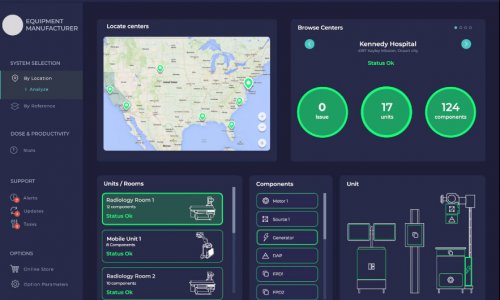IBM Watson Ushers in a New Era of Data-Driven Discoveries
IBM announced significant advances in Watson's cognitive computing capabilities that are enabling researchers to accelerate the pace of scientific breakthroughs by discovering previously unknown connections in Big Data.

Available now as a cloud service, IBM's Watson Discovery Advisor is designed to scale and accelerate discoveries by research teams. It reduces the time needed to test hypotheses and formulate conclusions that can advance their work -- from months to days and days to just hours -- bringing new levels of speed and precision to research and development.
Building on Watson's ability to understand nuances in natural language, Watson Discovery Advisor can understand the language of science, such as how chemical compounds interact, making it a uniquely powerful tool for researchers in life sciences and other industries.
Researchers and scientists from leading academic, pharmaceutical and other commercial research centers have begun deploying IBM's new Watson Discovery Advisor to rapidly analyze and test hypotheses using data in millions of scientific papers available in public databases. A new scientific research paper is published nearly every 30 seconds, which equals more than a million annually (Source: CiteSeerx). According to the National Institutes of Health, a typical researcher reads about 23 scientific papers per month, which translates to nearly 300 per year, making it humanly impossible to keep up with the ever-growing body of scientific material available.
In 2013, the top 1,000 research and development companies spent more than $600 billion annually on research alone (Source: Strategy&). Progress can be slow, taking an average of 10 to 15 years for a promising pharmaceutical treatment to progress from the initial research stage into practice (Source: Pharmaceutical Research and Manufacturers of America). Using Watson Discovery Advisor, researchers can uncover new relationships and recognize unexpected patterns among data that have the potential to significantly improve and accelerate the discovery process in research and science.
“We're entering an extraordinary age of data-driven discovery," said Mike Rhodin, senior vice president, IBM Watson Group. "Today's announcement is a natural extension of Watson's cognitive computing capability. We're empowering researchers with a powerful tool which will help increase the impact of investments organizations make in R&D, leading to significant breakthroughs."
Leading life sciences organizations are deploying Watson Discovery Advisor to advance discoveries in ongoing research projects, including Baylor College of Medicine, Johnson & Johnson and The New York Genome Center.
In a retrospective, peer reviewed study released this week by Baylor College of Medicine and IBM, scientists demonstrated a possible new path for generating scientific questions that may be helpful in the long term development of new, effective treatments for disease. In a matter of weeks, biologists and data scientists using the Baylor Knowledge Integration Toolkit (KnIT), based on Watson technology, accurately identified proteins that modify p53, an important protein related to many cancers, which can eventually lead to better efficacy of drugs and other treatments. A feat that would have taken researchers years to accomplish without Watson's cognitive capabilities, Watson analyzed 70,000 scientific articles on p53 to predict proteins that turn on or off p53's activity. This automated analysis led the Baylor cancer researchers to identify six potential proteins to target for new research. These results are notable, considering that over the last 30 years, scientists averaged one similar target protein discovery per year.
“On average, a scientist might read between one and five research papers on a good day,” said Dr. Olivier Lichtarge, the principal investigator and professor of molecular and human genetics, biochemistry and molecular biology at Baylor College of Medicine. “To put this in perspective with p53, there are over 70,000 papers published on this protein. Even if I’m reading five papers a day, it could take me nearly 38 years to completely understand all of the research already available today on this protein. Watson has demonstrated the potential to accelerate the rate and the quality of breakthrough discoveries. "
Johnson & Johnson is collaborating with the IBM Watson Discovery Advisor team to teach Watson to read and understand scientific papers that detail clinical trial outcomes used to develop and evaluate medications and other treatments. This collaboration hopes to accelerate comparative effectiveness studies of drugs, which help doctors match a drug with the right set of patients to maximize effectiveness and minimize side effects. Typically, comparative effectiveness studies are done manually, requiring three people to spend an average of 10 months (2.5 man-years) just to collect the data and prepare them for use before they are able to start analyzing, generating and validating a hypothesis. In this research study, the team hopes to teach Watson to quickly synthesize the information directly from the medical literature, allowing researchers to start asking questions about the data immediately to determine the effectiveness of a treatment compared to other medications, as well as its side effects.
Sanofi is exploring how working with Watson can speed up the discovery of alternate indications for existing drugs (drug re-purposing). Watson is able to understand and extract key information by reading millions of pages of scientific literature and then visualizes relationships between drugs and other potential diseases they could target while providing supporting evidence each step of the way. Drug Safety and Toxicity is a major driver of the high failure rate in clinical development / trials. Sanofi is exploring how Watson's ability to understand, extract and organize toxicological information can enable researchers to make better informed decisions with respect to candidate progression
IBM Watson will be supporting the analysis in New York Genome Center’s clinical study to advance genomic medicine. The clinical study will initially focus on clinical application of genomics to help oncologists deliver DNA-based treatment for glioblastoma, an aggressive form of brain cancer that kills more than 13,000 Americans each year. Despite tremendous discoveries into the genetic drivers of diseases like cancer over the past decade, big data makes it difficult to translate DNA data into life-saving treatments. Based on results from the clinical study, IBM Watson could soon help scale up the availability of personalized treatment options.
04.09.2014





